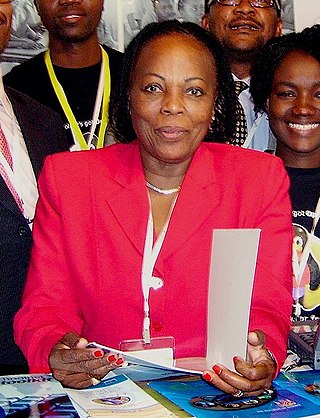Frequent persons on Namibia's street signs
countries
13 names / 36 streets
Sam Nujoma
 8
Samuel Shafiishuna Daniel Nujoma, is a Namibian revolutionary, anti-apartheid activist and politician who served three terms as the first President of Namibia, from 1990 to 2005. Nujoma was a...
8
Samuel Shafiishuna Daniel Nujoma, is a Namibian revolutionary, anti-apartheid activist and politician who served three terms as the first President of Namibia, from 1990 to 2005. Nujoma was a...
Libertina Amathila
 4
Libertina Inaviposa Amathila is a Namibian physician and politician. She was the Deputy-Prime Minister of Namibia from March 2005 to March 2010.
4
Libertina Inaviposa Amathila is a Namibian physician and politician. She was the Deputy-Prime Minister of Namibia from March 2005 to March 2010.
Hage Geingob
 3
Hage Gottfried Geingob was a Namibian politician who served as the third president of Namibia from 2015 until his death in February 2024. Geingob was the first Prime Minister of Namibia from 1990 to...
3
Hage Gottfried Geingob was a Namibian politician who served as the third president of Namibia from 2015 until his death in February 2024. Geingob was the first Prime Minister of Namibia from 1990 to...
Moses ǁGaroëb
 3
Moses Mague ǁGaroëb was a Namibian politician, founding member of SWAPO, and member of SWAPO's Politburo and Central Committee. During his political career, ǁGaroëb served in the Constituent Assembly...
3
Moses Mague ǁGaroëb was a Namibian politician, founding member of SWAPO, and member of SWAPO's Politburo and Central Committee. During his political career, ǁGaroëb served in the Constituent Assembly...
Robert Mugabe
 2
Robert Gabriel Mugabe was a Zimbabwean revolutionary and politician who served as Prime Minister of Zimbabwe from 1980 to 1987 and then as President from 1987 to 2017. He served as Leader of the...
2
Robert Gabriel Mugabe was a Zimbabwean revolutionary and politician who served as Prime Minister of Zimbabwe from 1980 to 1987 and then as President from 1987 to 2017. He served as Leader of the...
Agostinho Neto
 2
António Agostinho Neto was an Angolan communist politician and poet. He served as the first president of Angola from 1975 to 1979, having led the Popular Movement for the Liberation of Angola (MPLA)...
2
António Agostinho Neto was an Angolan communist politician and poet. He served as the first president of Angola from 1975 to 1979, having led the Popular Movement for the Liberation of Angola (MPLA)...
Nelson Mandela
 2
Nelson Rolihlahla Mandela was a South African anti-apartheid activist, politician, and statesman who served as the first president of South Africa from 1994 to 1999. He was the country's first black...
2
Nelson Rolihlahla Mandela was a South African anti-apartheid activist, politician, and statesman who served as the first president of South Africa from 1994 to 1999. He was the country's first black...
Mandume ya Ndemufayo
 2
Mandume ya Ndemufayo was the last king of the Oukwanyama, a subset of the Ovambo people of southern Angola and northern Namibia. Ya Ndemufayo took over the kingdom in 1911 and his reign lasted until...
2
Mandume ya Ndemufayo was the last king of the Oukwanyama, a subset of the Ovambo people of southern Angola and northern Namibia. Ya Ndemufayo took over the kingdom in 1911 and his reign lasted until...
Hidipo Hamutenya
 2
Hidipo Livius Hamutenya was a Namibian politician. A long time leading member of the South West Africa People's Organization (SWAPO), Hamutenya was a member of the Cabinet of Namibia from...
2
Hidipo Livius Hamutenya was a Namibian politician. A long time leading member of the South West Africa People's Organization (SWAPO), Hamutenya was a member of the Cabinet of Namibia from...
Gustav Nachtigal
 2
Gustav Nachtigal was a German military surgeon and explorer of Central and West Africa. He is further known as the German Empire's consul-general for Tunisia and Commissioner for West Africa. His...
2
Gustav Nachtigal was a German military surgeon and explorer of Central and West Africa. He is further known as the German Empire's consul-general for Tunisia and Commissioner for West Africa. His...
Tobias Hainyeko
 2
Tobias Hainyeko (1932–1967) was a Namibian guerrilla fighter who served as the first commander of the People's Liberation Army of Namibia (PLAN) during the Namibian War of Independence from the 1960s...
2
Tobias Hainyeko (1932–1967) was a Namibian guerrilla fighter who served as the first commander of the People's Liberation Army of Namibia (PLAN) during the Namibian War of Independence from the 1960s...
Thomas Edison
 2
Thomas Alva Edison was an American inventor and businessman. He developed many devices in fields such as electric power generation, mass communication, sound recording, and motion pictures. These...
2
Thomas Alva Edison was an American inventor and businessman. He developed many devices in fields such as electric power generation, mass communication, sound recording, and motion pictures. These...
Theo-Ben Gurirab
 2
Theo-Ben Gurirab was a Namibian politician who served in various senior government positions. He served as the second Prime Minister of Namibia from 28 August 2002 to 20 March 2005, following the...
2
Theo-Ben Gurirab was a Namibian politician who served in various senior government positions. He served as the second Prime Minister of Namibia from 28 August 2002 to 20 March 2005, following the...